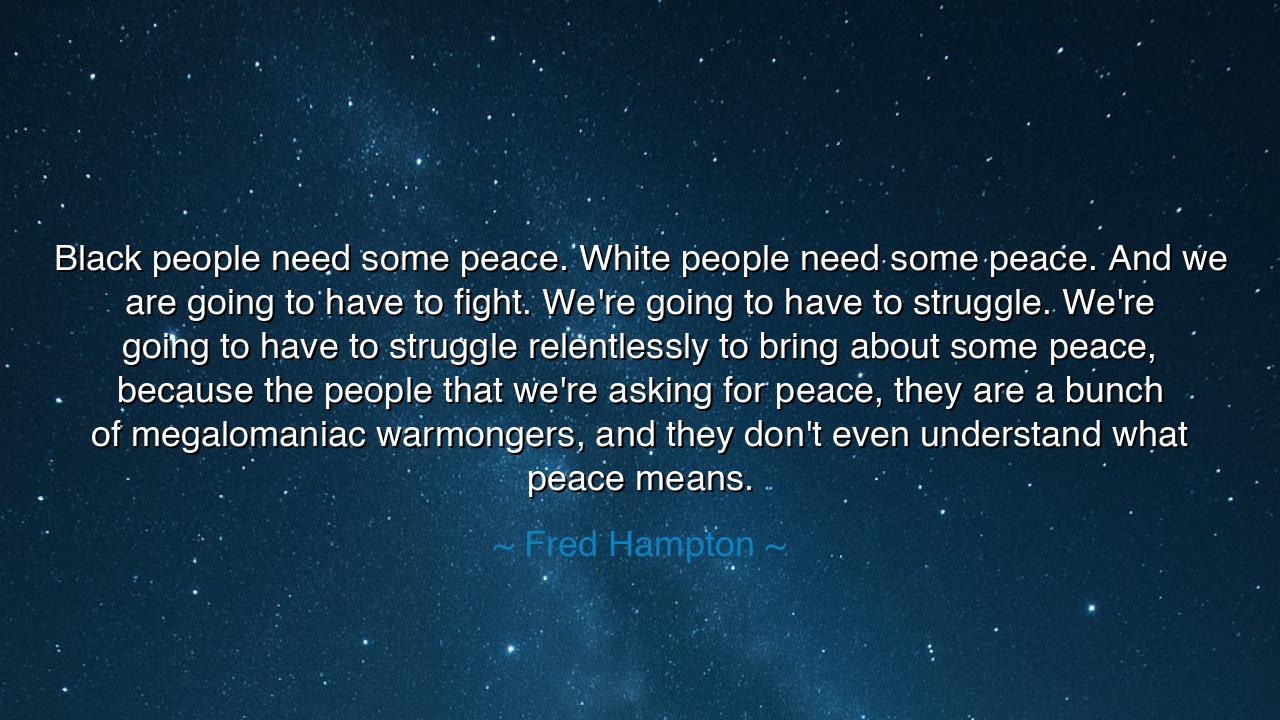
Black people need some peace. White people need some peace. And
Black people need some peace. White people need some peace. And we are going to have to fight. We're going to have to struggle. We're going to have to struggle relentlessly to bring about some peace, because the people that we're asking for peace, they are a bunch of megalomaniac warmongers, and they don't even understand what peace means.






Hear, O children of the future, the fiery words of Fred Hampton: “Black people need some peace. White people need some peace. And we are going to have to fight. We’re going to have to struggle. We’re going to have to struggle relentlessly to bring about some peace, because the people that we’re asking for peace, they are a bunch of megalomaniac warmongers, and they don’t even understand what peace means.” In this utterance is the cry of a prophet cut down too soon, a cry not for vengeance, but for justice, not for war’s triumph, but for peace born of struggle. He speaks as one who understood that peace is not given freely by oppressors, but carved out of the stone of resistance.
The peace of which Hampton speaks is no shallow silence, no forced stillness where injustice festers beneath. It is not the peace of the graveyard, nor the peace of chains upon the oppressed. It is a peace forged in struggle, where dignity is restored, and equality is no longer a dream but a living reality. His words teach that true peace requires battle—not the battle of hatred, but the battle of courage against those who profit from division, who thrive on chaos, who cloak themselves in power yet tremble at justice.
The ancients knew this truth well. Consider the story of Spartacus, who rose against Rome’s chains. He did not fight for conquest, nor for empire, but for freedom from the lash, for a peace where men could stand unbowed. Though he fell, his struggle shook the mighty, and his name endures as a symbol of resistance. So too did Hampton understand: peace for both Black and White, for all peoples, would not fall from the hands of rulers. It must be seized by those who dared to struggle relentlessly.
Yet Hampton’s vision was not narrow. He did not cry only for his own people, but for all who yearned for release. He spoke of the unity of the oppressed, of a peace where divisions of color would no longer be weapons in the hands of tyrants. In this he walked the path of the great teachers, who declared that the liberation of one is bound to the liberation of all. His struggle was heroic because it transcended hatred; it sought to build where others sought only to destroy.
But hear also the warning in his words. He called the powers of his time “megalomaniac warmongers.” He named them as those who do not even understand what peace means. This is the eternal challenge: those who feast upon war, who profit from suffering, will never grant peace, for it threatens their throne. Thus, Hampton’s teaching reminds us that the struggle must be unyielding, for those who love war will resist the birth of peace with all their might.
The lesson is thus: if you seek peace, do not be passive. Do not mistake silence for peace, nor comfort for justice. Peace is not the absence of noise, but the presence of fairness. It requires struggle, sacrifice, and unity. It requires speaking truth to power, lifting the burdens of the oppressed, and refusing to surrender even when the path grows steep. Those who desire peace without struggle will inherit only the illusions of peace, but those who dare to labor for it will sow seeds that future generations will harvest.
Practical action calls to you. Stand for justice wherever you see oppression, even if it does not touch you directly. Seek solidarity, not division, for peace belongs to all people. Confront systems that profit from violence, whether in your nation, your community, or your home. And above all, commit yourself to relentless persistence, for peace delayed is not peace denied if the struggle is not abandoned.
Thus, O children of tomorrow, remember Fred Hampton’s cry. Let it be written on your hearts: peace is a treasure too great to be given freely—it must be fought for, struggled for, and preserved by courage. And when you rise to labor for peace, know this: you walk in the company of prophets, martyrs, and heroes who gave their lives so that future generations might breathe freely beneath the sun. Struggle relentlessly, that true peace may be born.






AAdministratorAdministrator
Welcome, honored guests. Please leave a comment, we will respond soon